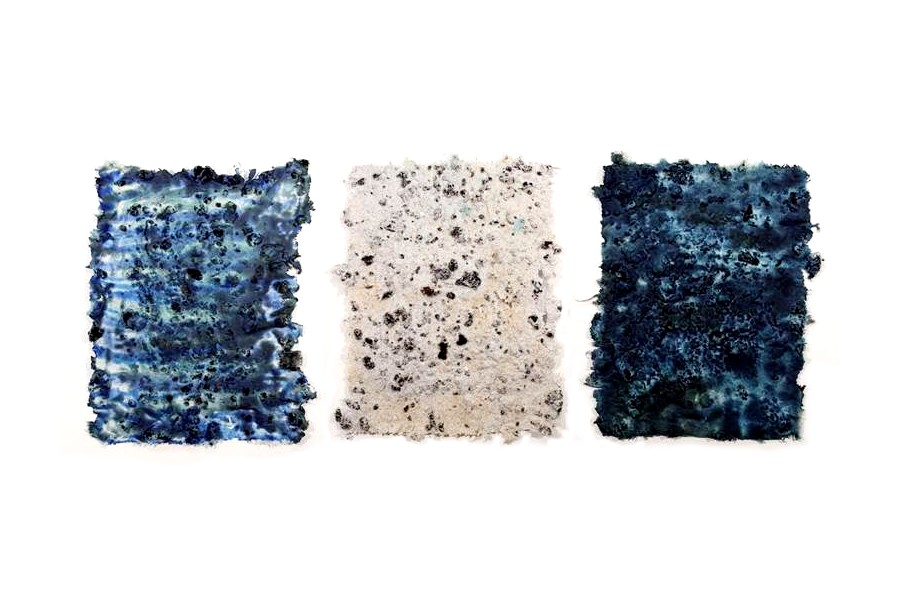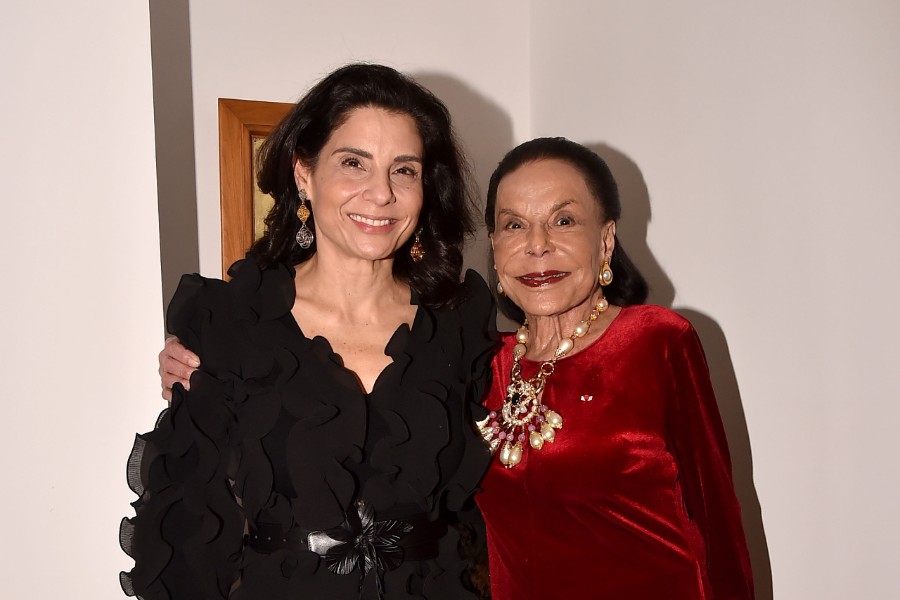
Claire Oliver Gallery is pleased to announce the solo exhibition Remains by artist Adebunmi Gbadebo.
On view January 13 – March 11, 2023, the exhibition continues Gbadebo’s years-long exploration of her ancestral origins centered on the plantation on which her forbearers were enslaved and currently buried, called True Blue in Fort Motte, South Carolina.
Gbadebo’s interrogation of this lineage through her work encompasses her signature multi-media paper works crafted from indigo, rice paper, cotton, and human hair, and new ceramic works fabricated from the soil in which her enslaved ancestors were buried.
These will be displayed alongside historical artifacts salvaged from antebellum architectural fragments from sites built on the labor of her forebears.
The multi-media exhibition will debut at Claire Oliver Gallery before traveling to the Weisman Art Museum in Minneapolis throughout 2023-24.
“I’ve been dedicated to exploring materials, like rice, indigo and cotton, whose origins as commodities were born of violence and enslavement,” states Gbadebo. “My newest work is even more intimate and personal: I have crafted ceramic vessels from the very land that was once cleared by my ancestors as a way to commemorate what they endured and as a way to activate the land, using it and shaping it. The making of the work has been a practice of healing and a practice of care for their memories and what remains of their physical bodies, it’s in the soil.”

Ceramic Works
Rejecting traditional art materials privileged by the Eurocentric canon, Gbadebo investigates history and identity through materials that challenge the very substance of art making. In her latest ceramic works, created during a fellowship at The Clay Studio in Philadelphia, Gbadebo developed her own clay sourced from her ancestral cemetery at the former True Blue plantation in Fort Motte, South Carolina. Imbued with veneration for the generations that have preceded her, the vessels themselves are created to be purposefully abstract as a nod to her own artistic freedoms in contrast to the confines of her ancestors. The vessels were created using a traditional West African coil technique and then pit fired to achieve the unique black pattern and glazing, serving as solemn funereal vessels. Some are embellished with locks of human hair, underscoring the bodies within the soil itself, while others feature grains of Carolina gold rice, the variety of rice grown on True Blue plantation signifying the labor of her ancestors.
Paper Works
With a studio practice anchored in material innovation and exploration of the concept of commodities and labor, Gbadebo creates unique multimedia “portraits” by beating together human hair, cotton, rice paper and indigo dye. A central material for Gbadebo is human hair, which carries the very DNA of the people whose histories she is telling. With permission to incorporate this deeply personal material in her work from those who share their hair, she enlists them as collaborators and symbolizes human connections within the larger African Diaspora. As hair carries unique DNA chromosomes that remain for between 1,000 and 10,000 years, Gbadebo’s use of genes as a material reframes the microcosm of ancestry as point of entry through which to unpack larger global histories. The finished works are rendered as beautifully pigmented, layered portraits—topological maps of her community’s history.
Architectural Fragments
The exhibition also features antebellum architectural fragments salvaged from several sites in and near Fort Motte, South Carolina. Objects include an original hand-hewn church pew from Old Jerusalem Church which was built by Gbadebo’s family directly after emancipation; a wrought iron finial from a yard fence; and a brick, a wood balcony fragment, and a rail spike all hailing from the McCord House, which was an antebellum home built by her enslaved ancestors. These fragments are positioned in dialogue with Gbadebo’s works as a further interrogation of materiality and the stolen labor of her ancestors.
A portion of all proceeds from the exhibition will benefit the preservation and maintenance of the land, led by Gbadebo’s cousin Jackie Whitmore owned by New Jerusalem Church in Fort Motte, South Carolina.
Claire Oliver Gallery
Claire Oliver Gallery is located in Central Harlem in a four-story brownstone. For nearly 25 years, Claire Oliver Gallery has showcased and celebrated artwork, with a focus on work by women and people of color, which transcends and challenges the traditional art historical canon. Our forward-thinking program and exclusive commitment to the primary market allows for an intensive focus that has nurtured and grown the careers of our artists. Many of the gallery’s artists have been included in The Venice Biennale, The Whitney Biennial, and biennales in Sydney, Pittsburgh, and Lyon and have exhibited works in major international museums including the Smithsonian American Art Museum, The Art Institute of Chicago, Center Georges Pompidou, The Philadelphia Museum of Art, and The Los Angeles County Museum of Art amongst others. Claire Oliver Gallery artists are included in the permanent collections of many important museums worldwide including The Smithsonian American Art Museum, The Art Institute of Chicago, The Tate Britain, The Metropolitan Museum of Art, The State Hermitage Museum, MoMA, and the Museum of Arts and Design amongst many others. Claire Oliver Gallery held the first American exhibition for the Russian collaborative AES+F, whose work went on to twice represent Russia in the Russian pavilion of the Venice Biennale. Gallery artists have received prestigious fellowships including Fulbright, Guggenheim, USArtist and National Endowment for the Arts, 2288 Adam Clayton Powell Jr. Boulevard, New York, NY 10030, www.claireoliver.com
Photo credit: 1) A Dilemma of Inheritance, Page 2, 2020. 2) Jane/Mother of H. Lee/Died Feb 15 1909/ Age 85 yrs/ Gone To Fairer Land/ of Pleasure & Love/ To Join The Bright Band of Angels Above.
Become a Harlem Insider!
By submitting this form, you are consenting to receive marketing emails from: . You can revoke your consent to receive emails at any time by using the SafeUnsubscribe® link, found at the bottom of every email. Emails are serviced by Constant Contact








